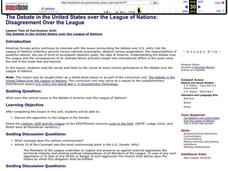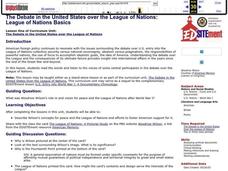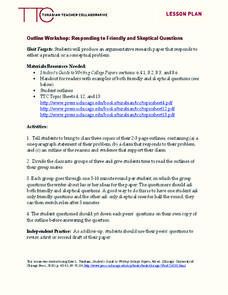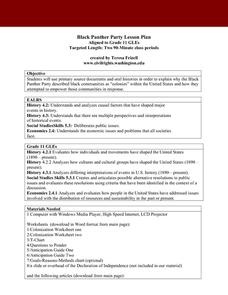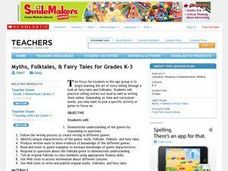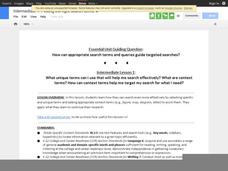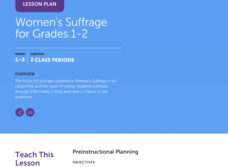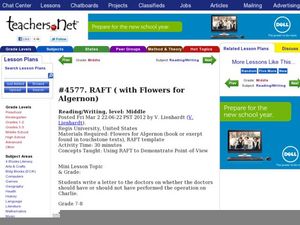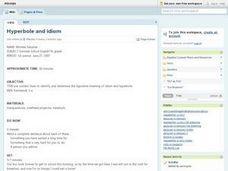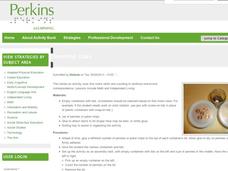Curated OER
Vocabulary through Text
Explore word meanings. Sixth graders identify examples of words with affixes while listening to the story Paul Bunyan by Steven Kellogg. They participate in the game "Pass the Parts" and practice separating given words into their root...
Curated OER
Differing Federal Responses to the Great Depression: Letter Analysis
Young analysts examine two letters, one written by President Hoover and one written by FDR. Each letter contains that president's response to the role of the Federal Government during times of crisis (The Great Depression). They analyze...
Curated OER
The Debate in the United States over the League of Nations: Disagreement Over the League
High schoolers examine the opposition of the US Senate to Woodrow Wilson's idea of a League of Nations. They discuss the central ideas involved in the debate over the League.
Curated OER
The Debate in the United States over the League of Nations: League of Nations Basics
Students examine Woodrow Wilson's ideas for peace and the League of Nations. They examine how he garnered supported of it by looking at images and discussing their context.
Turabian Teacher Collaborative
Outline Workshop: Responding to Friendly and Skeptical Questions
Answering questions is the best way to hone and revise your argument. Foster receptive writers with a workshop activity that promotes peer editing and argumentative writing skills. Given lists of both friendly and skeptical questions,...
Curated OER
I Am Special and You Are Special Too #4
The students listen to a book about being different and investigate that everyone is different, but special in their own unique way. The students draw a picture of themselves using multi-cultural markers. Along with the drawing, the...
Curated OER
Black Panther Party Lesson Plan
Why did the Black Panther Party feel colonized, and what methods did they employ to achieve empowerment? Your class members will engage in an online PowerPoint presentation, analysis of several documents, and discussion in order to...
Curated OER
Myths, Folktales, & Fairy Tales for Grades K-3
Have your class explore the art of storytelling through this instructional activity on fairy tales and folktales. Learners interact with a variety of fairy tales and folktales. They practice telling stories out loud as well as writing...
Lakeshore Learning
Winter Bear Warm-Up
Don't be left out in the cold, ensure young learners are prepared for the winter weather with this clothing activity. After introducing them to different clothing items using the provided picture cards, students sing a song before...
Google
Intermediate 1: Picking the Right Search Terms
A search can be strengthened by unique terms. With the activities and presentation included here, show your class how to target their searches with unique terms and context terms. They can then practice their search skills with...
Virginia Polytechnic Institute and State University
Lesson Plan: Omelet Cooking Principles
Although designed for a foods lab, the information in this resource might be just the thing for your own recipe notebook. Illustrated, step-by-step directions for making the perfect omelet, egg-citing puzzles, games, and even...
Practical Money Skills
Making Money
The first step in managing your money is making money! Learn about ways to find and interview for a job with a thorough lesson on personal finances. Kids learn about the ways to earn a paycheck and then manage the funds they receive.
Scholastic
Women's Suffrage for Grades 1–2
Scholars take part in a grand conversation after they examine facts and stories about the Women's Suffrage Movement. Eight discussion questions bring light to influential women, the importance of voting, citizenship, and voting rights.
BrainPOP
Latitude and Longitude Differentiated Lesson Plan
Scholars warm-up their map skills with a discussion using location words to describe familiar places. An engaging video informs class members about latitude and longitude. Three leveled activities extend the learning experience for...
Curated OER
Flowers for Algernon: RAFT
Should Charlie undergo an operation to increase his intelligence? A mini-lesson for a unit on Daniel Keyes novel Flowers for Algernon uses a RAFT activity, which prompts students to write a letter to Charlie's doctors explaining why they...
Achieve3000
Context Clues and Idioms
Kids practice using five types of context clues (definition, synonym, antonym, example, and general) to decode idiomatic language.
Cornell University
Constructing and Visualizing Topographic Profiles
Militaries throughout history have used topography information to plan strategies, yet many pupils today don't understand it. Scholars use Legos and a contour gauge to understand how to construct and visualize topographic profiles. This...
Curated OER
American Revolution Simulation
Young scholars explore the grievances of the American colonists. They relate to that which is held most dearly i.e. life, liberty and the pursuit of happiness.
Curated OER
Block Buster
Here is a unique and innovative game which will help your charges learn the important skill of proofreading and editing their own writing. The class is divided up into groups, and each group uses actual samples of writing from students...
Curated OER
Telling Time Lesson Plan
Judy Clocks are a great invention. Here, learners review telling time to hour and half hour on Judy clocks, begin telling time to quarter hour, use clock stamps to practice, and play computer games using Trudy's Time and Place House...
Curated OER
Light and Elements
Here is a full-fledged investigation of light waves, the electromagnetic spectrum, and element spectra. Physicists research a scientist that contributed to our understanding of the behavior of light. They take notes on your lecture, and...
Curated OER
Hyperbole and Idiom
Seventh graders use context clues to determine the figurative meaning of idioms and hyperboles. They practice writing idioms and hyperboles in sentences about real life situations around them. This lesson is a good way to improve variety...
Curated OER
Role Models
First graders identify heroes by researching their family history. In this personal heritage lesson, 1st graders define the term "hero" and the characteristics that represent it. Students research family resources and family trees in...
Perkins School for the Blind
Counting Cups
Teach one-to-one correspondence, fine motor, and counting skills to your learners with visual disabilities. Included are a set of activity suggestions, which are useful when teaching a variety of different early math skills. Braille,...




